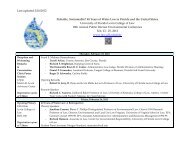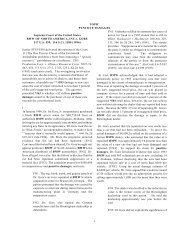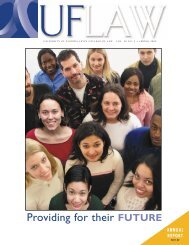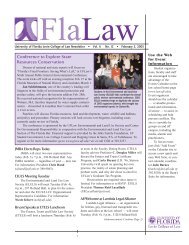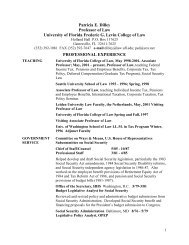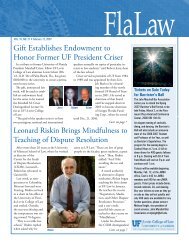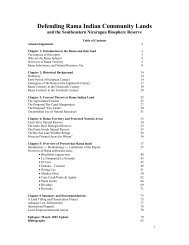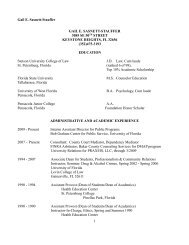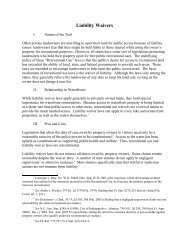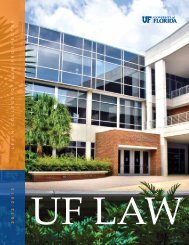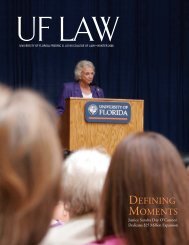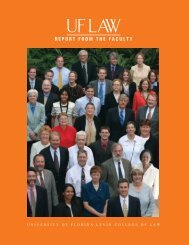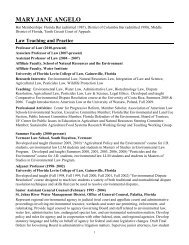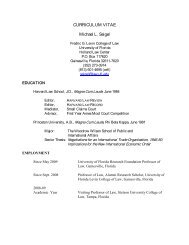Download Magazine - Levin College of Law - University of Florida
Download Magazine - Levin College of Law - University of Florida
Download Magazine - Levin College of Law - University of Florida
You also want an ePaper? Increase the reach of your titles
YUMPU automatically turns print PDFs into web optimized ePapers that Google loves.
In the old Alligator Alley, AndyOwens (JD 72) could feel his wayaround the basketball court. Withhis teammates at the <strong>University</strong><strong>of</strong> <strong>Florida</strong> in the late 1960s,Owens sweated through countlesspractices, scrimmages andgames at <strong>Florida</strong> Gym, devoting endlesshours to dribbling around the well-wornhardwood and finding those places wherehe could launch shots with a feeling so truehe thought he couldn’t miss.“Every day I’d go up early and stay lateand pick different spots on the floor andshoot 30 or 40 jump shots,” recalls Owens,who set school records his senior year forpoints in a season in 1969-70, when he averaged27 points per game, a UF mark thatstill stands. “When the game comes andyou can get the ball in that spot, you knowyou’re going to make it. To me that’s theway I could develop confidence.”Today, after 25 years as a circuit judgein Sarasota, Owens tries to instill that samepersistence in young people whose livescouldn’t be more different than the one hehas known, men and women living precariouslyon society’s edge.“I’ve always had a desire to try makea difference and help people,” Owens saidas he sat in his <strong>of</strong>fice in the courthouse indowntown Sarasota. ‘I just felt that as ajudge you would be able to make a differencein your community, and I certainlythink that you can.”A decade ago, Owens helped create aMental Health Court in Sarasota, as well asa Court Intervention Program. Also knownas Drug Court, the year-long outpatient programfor felony drug <strong>of</strong>fenders has givenOwens a chance to reach out a hand and liftup those who have fallen down into indescribabledepths.“Kids today all feel bulletpro<strong>of</strong>,”he said.Young people have a very difficult timereasoning abstractly, he explains, thinkingbad things, like getting arrested for drugs,only happens to other people, it won’t happento them. It’s okay if I experiment, theythink, I’ll never get in trouble.“But regrettably, that’s not the case,”Owens said. “And so a lot <strong>of</strong> good kidsend up making a stupid decision. And nowthey’re caught, arrested for a felony andSARASOTA HERALD TRIBUNE STAFF PHOTOGRAPHER/CHIP LITHERLANDCircuit Court Judge Andrew Owensconfers with counsel on the firstday <strong>of</strong> the Carlie Brucia murder trialon Nov. 7, 2005. Joseph Smith waslater convicted and sentenced todeath for the abduction and killing<strong>of</strong> the 11-year-old Sarasota child.“I think the lessonsthat you learn inathletics apply wellto life; primarilypersistence.”having a felony on your record carriesthrough for the rest <strong>of</strong> your life.”The goal <strong>of</strong> the Court Intervention Programis to help these young people makechanges in their lives that will lead them tomake better decisions. First-time <strong>of</strong>fenderswho complete the program can have theircharges dismissed. For others who havemultiple <strong>of</strong>fenses on their record, the hopeis the program will help them turn theirlives around.Emotion wells up in Owens’ eyes andin his voice when he talks about the peoplewhose lives literally have been saved by thedrug court. One woman walked into Owens’courtroom in 1997 with a long list <strong>of</strong>10 felony convictions on her record, includingdrugs and prostitution.Brenda Owens-Philhower grew up inSarasota. She began using drugs at age 13.By the time she went before Owens at theage <strong>of</strong> 33, she was estranged from her familyand friends, addicted to crack cocaineand living behind a dumpster. She weighed87 pounds.“I was looking at a 10-year sentence,”recalls Owens-Philhower, who is no relationto the judge, though she now affectionatelyrefers to him as her long-lost uncle. “Ihad already been in prison once, and basicallyDrug Court was not supposed to takeme because I was already a convicted felonand had been to prison. But Judge Owens,he knew I was going to die.”Given one more chance to turn her lifearound, Owens-Philhower grabbed theopportunity with everything she had, becomingthe program’s first graduate. Shereturns to Owens’ court every year so thejudge can present her with a medallion tosignify her accomplishment. She eventuallyreceived a pardon from Gov. Jeb Bush,who posed for a photo with her that sits inOwens’ <strong>of</strong>fice.Owens-Philhower has gone on towork as counselor to help others get <strong>of</strong>fdrugs, and this fall opened her own outpatientdrug and alcohol recovery programin Ocala called Recovery Road.She has been a featured speaker for The<strong>Florida</strong> Bar, the Guardian Ad Litem Programand <strong>Florida</strong>’s drug courts. She’sbeen recognized with <strong>Florida</strong>’s Points <strong>of</strong>Light Award by both Gov. Bush and currentGov. Charlie Crist.She and Judge Owens share a specialrelationship. The judge presided overOwens-Philhower’s wedding vows. Heryoungest daughter, Elnora, 14, inspired bythe man who literally saved her mother’s life,wants to go on to law school, and her oldestdaughter, Dominique, 17, takes criminaljustice classes at night while in high school.He’s the first person she calls when her girlsbring home their report cards.“He cares about each individual,” Owens-Philhowersaid <strong>of</strong> the judge. “He believesthat addicts and alcoholics deserve asecond chance. Not a lot <strong>of</strong> judges care aboutus. Everything that I do in my life is because<strong>of</strong> Judge Owens. Me getting my own business,me buying my own home, me gettingFALL 2008 27



